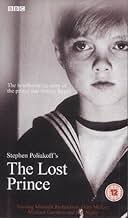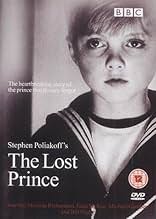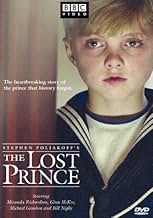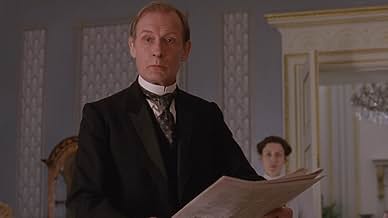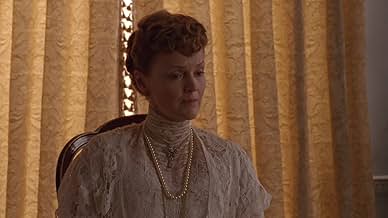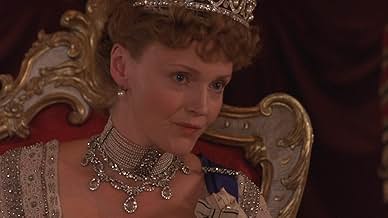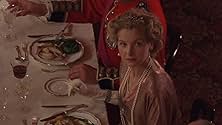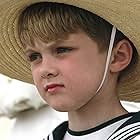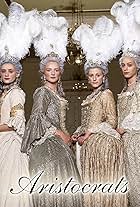NOTE IMDb
7,6/10
2,2 k
MA NOTE
Ajouter une intrigue dans votre langueThe story of Prince John, the autistic and epileptic youngest son of Queen Mary and King George V, who spent his whole life hidden away from public view and died at the age of 13 in 1919.The story of Prince John, the autistic and epileptic youngest son of Queen Mary and King George V, who spent his whole life hidden away from public view and died at the age of 13 in 1919.The story of Prince John, the autistic and epileptic youngest son of Queen Mary and King George V, who spent his whole life hidden away from public view and died at the age of 13 in 1919.
- Récompensé par 3 Primetime Emmys
- 8 victoires et 21 nominations au total
Avis à la une
This lavish production, uses the vehicle of the short life "The Lost (from history) Prince" to portray what Royal Life was like at the turn of century. The sumptuous production illustrates the splendour, luxury, misery and ultimately the futility of the Royals. There are wonderful images of the beautiful daughters of the tsar. Epileptic Prince John is however seen as the only one as being allowed to be himself. Wonderful performances of the roles of the ice queen Queen Mary, Lalla the nursemaid, Prince John young and old.Has been criticised for being too long, but you must try and get to see this when it comes to your country.
Historical facts, Prince John died aged 14 isolated from his family in a farmhouse at Sandringham? cared for by Lalla Bill. Only one historical reference to him still existed. The height of George V is still a secret.
Historical facts, Prince John died aged 14 isolated from his family in a farmhouse at Sandringham? cared for by Lalla Bill. Only one historical reference to him still existed. The height of George V is still a secret.
This is a truly wonderful production with brilliant, almost surreal touches that lift this drama about the crowd.
I would love to know if any of Prince John's drawings survived. They had, or at least the ones used for the film had a Chagal-like quality that was both very graceful and artistic and filled with insite as to the inner character of the subjects. "The Tsar Swimming" and "Fat Mary" are two example. His father wearing a crown far too big for his head is a masterpiece.
I also wonder if Prince John wasn't a savant. His drawings were exceptional and far ahead of his time and his musical ability was,(if the film properly portrayed this talent)quite remarkable.
What is wonderful about this film is the sense that John despite everything managed to form his own little community on his "Estate", surrounded by people who really did love him. I also have the feeling that he was quite a happy child most of the time.
His parents were no worse than other Royal parents and a great deal better than most.
Special mention should be made of the marvelous Bibi Anderson who played Queen Alexandra so perfectly. At the funeral she even managed to look almost exactly like the Dowager Queen.
Someone mentioned that they didn't believe that the Tsar and the Tsarina would have acted as coldly toward their relations when visiting at Cowes. Unfortunately, that's just how they acted. They did believe that they were seated higher at the table of the Rulers of the World than their cousins in England who had to make-do with smaller versions of their own vast palaces in St. Petersburg. After all the Tsar was the last Absolute Monarch in the world. He even had to approve of every marriage and every divorce. No decision could be made unless he gave his approval. His cousin George had to actually deal with a rabble of advisors and that intrusive Parliment.
The scenes of the Tsar swimming were especially out of touch with reality, just as the Tsar was out of touch with the reality of his situation.
The Russian Grand Duchesses were so dream-like in their lovely summer laces and huge flower-like hats. All of John's imagined scenerios were touched with this combination of wistfullness and joy.
I mention these things because they haven't been mentioned before and they are what I will bring with me forever. Those haunting images of the children running on the beach, the flower-hats in the flower-garden and John peeking through the rails of the balcony at the beautiful lady at the banquet who smiles and waves back at him...a small and precious moment to be treasured.
See this film and fall in love with a child that refuses to be "Lost".
I would love to know if any of Prince John's drawings survived. They had, or at least the ones used for the film had a Chagal-like quality that was both very graceful and artistic and filled with insite as to the inner character of the subjects. "The Tsar Swimming" and "Fat Mary" are two example. His father wearing a crown far too big for his head is a masterpiece.
I also wonder if Prince John wasn't a savant. His drawings were exceptional and far ahead of his time and his musical ability was,(if the film properly portrayed this talent)quite remarkable.
What is wonderful about this film is the sense that John despite everything managed to form his own little community on his "Estate", surrounded by people who really did love him. I also have the feeling that he was quite a happy child most of the time.
His parents were no worse than other Royal parents and a great deal better than most.
Special mention should be made of the marvelous Bibi Anderson who played Queen Alexandra so perfectly. At the funeral she even managed to look almost exactly like the Dowager Queen.
Someone mentioned that they didn't believe that the Tsar and the Tsarina would have acted as coldly toward their relations when visiting at Cowes. Unfortunately, that's just how they acted. They did believe that they were seated higher at the table of the Rulers of the World than their cousins in England who had to make-do with smaller versions of their own vast palaces in St. Petersburg. After all the Tsar was the last Absolute Monarch in the world. He even had to approve of every marriage and every divorce. No decision could be made unless he gave his approval. His cousin George had to actually deal with a rabble of advisors and that intrusive Parliment.
The scenes of the Tsar swimming were especially out of touch with reality, just as the Tsar was out of touch with the reality of his situation.
The Russian Grand Duchesses were so dream-like in their lovely summer laces and huge flower-like hats. All of John's imagined scenerios were touched with this combination of wistfullness and joy.
I mention these things because they haven't been mentioned before and they are what I will bring with me forever. Those haunting images of the children running on the beach, the flower-hats in the flower-garden and John peeking through the rails of the balcony at the beautiful lady at the banquet who smiles and waves back at him...a small and precious moment to be treasured.
See this film and fall in love with a child that refuses to be "Lost".
This short drama focused on the epileptic Prince John, son of George V and Queen Mary, and brother to the present Queen Elizabeth's father, George VI.
We see the story of John from the perspectives of himself and of his nurse, Lalla (the emotionless Gina McKee). As he becomes more out of control and an embarrassment to his family, the little boy becomes more special to the viewer. Johnny is a crank but a lovable one.
Daniel Williams and Matthew Thomas both make an impact as Prince John at different ages, while Tom Hollander and Miranda Richardson are excellent as his repressed and bewildered parents. There's also key roles of interest for Bill Nighy (Stamfordham), Frank Finlay (the PM, Herbert Asquith), and David Barrass (Kaiser Bill).
Aside from the problems accorded by John's illness and confinement, we also see how events unfold in Russia for George V's cousins, the ill-fated Romanov family.
'The Lost Prince' is another winner for writer/director Stephen Poliakoff, and well worth your time. Enjoyable whether you know the story or the intricacies of the Royal family, or not.
We see the story of John from the perspectives of himself and of his nurse, Lalla (the emotionless Gina McKee). As he becomes more out of control and an embarrassment to his family, the little boy becomes more special to the viewer. Johnny is a crank but a lovable one.
Daniel Williams and Matthew Thomas both make an impact as Prince John at different ages, while Tom Hollander and Miranda Richardson are excellent as his repressed and bewildered parents. There's also key roles of interest for Bill Nighy (Stamfordham), Frank Finlay (the PM, Herbert Asquith), and David Barrass (Kaiser Bill).
Aside from the problems accorded by John's illness and confinement, we also see how events unfold in Russia for George V's cousins, the ill-fated Romanov family.
'The Lost Prince' is another winner for writer/director Stephen Poliakoff, and well worth your time. Enjoyable whether you know the story or the intricacies of the Royal family, or not.
10Alex-372
The Lost Prince is a beautiful costume drama from Stephen Poliakoff, about the young brother of prince George, who nobody wanted to talk about and who was most likely autistic and most definitely epileptic, diseases respectively unknown and misunderstood at the time.
This story is roughly told through his eyes, and describes in beautiful detail the transition of Europe from a continent ruled by related monarchs (many of them Saxe-Coburg and Gotha), until the end of this system during and after WWI. As important historical events manage to find their way into palace life (the suffragette movement, the rise of ordinary people as politicians, the telephone and the motor car), they more often seem like foreign intrusions into the world of the palace.
As this is seen through the eyes of the little boy, there is very little value judgement as to whether this system was a right or just one, and at the end you are struck with the horror of the murder of the tsarist family and their beautiful daughters, but we never see the reign of terror they themselves and their secret police visited upon Russia.
There is a very funny incident when the tsarina during a visit to what she sees as her poor cousins estates, refuses to walk any further, because she has the "wrong shoes" for walking in the grass. Later, she remarks how "close" the houses of "other people" are and you can't help conclude she was simply afraid of being killed by the proletariat. :-)
Very well acted by Miranda Richardson (Blackadder), Michael Gambon, Tom Hollander, Gina McKee as the governess Lalla but especially by the two child actors who play Johnny. They look like great kids rather than brats.
Highly recommended if you can catch this on the BBC or HBO.
This story is roughly told through his eyes, and describes in beautiful detail the transition of Europe from a continent ruled by related monarchs (many of them Saxe-Coburg and Gotha), until the end of this system during and after WWI. As important historical events manage to find their way into palace life (the suffragette movement, the rise of ordinary people as politicians, the telephone and the motor car), they more often seem like foreign intrusions into the world of the palace.
As this is seen through the eyes of the little boy, there is very little value judgement as to whether this system was a right or just one, and at the end you are struck with the horror of the murder of the tsarist family and their beautiful daughters, but we never see the reign of terror they themselves and their secret police visited upon Russia.
There is a very funny incident when the tsarina during a visit to what she sees as her poor cousins estates, refuses to walk any further, because she has the "wrong shoes" for walking in the grass. Later, she remarks how "close" the houses of "other people" are and you can't help conclude she was simply afraid of being killed by the proletariat. :-)
Very well acted by Miranda Richardson (Blackadder), Michael Gambon, Tom Hollander, Gina McKee as the governess Lalla but especially by the two child actors who play Johnny. They look like great kids rather than brats.
Highly recommended if you can catch this on the BBC or HBO.
Stephen Poliakoff wrote and directed this which was shown over two weekends recently here in the UK. It was certainly a sumptuous production, I've rarely seen a costume drama more lavishly dressed.
It is broadly about the period 1908 to about 1920 seen through the eyes of the little known Prince John, youngest son of King George V and Queen Mary. Possibly autistic or with milder learning difficulties and known to be epileptic, this play shows his child's eye views of his grandfather the King (Edward VII) and the visit of the Tzar to the UK, following on to his own father's succession, through the Irish crisis and on to the the First World War. His father becomes King and he is packed off to the country, as his shortcomings emerge, with his faithful nurse Lala with only occasional visits from the aloof Queen Mary his mother, who just cannot understand him or his needs. His brother George, very bright and determined, is used as a foil to explain a lot of action as is the King's Secretary, Lord Stamfordham.
Miranda Richardson is superb as Queen Mary, catching her regality and vunerability in one, though Tom Hollander did less well as the King, he was a little young, the King being in his late forties/early fifties during this time, and Michael Gambon, a Poliakoff favourite (and the new Dumbledore apparently) does little more than a cameo as Edward VII. Gina McKee excels as Lala, determined to make Johnnie's parents just even notice him.
The King and Queen are here portrayed much younger than the geriatrics they are usually seen as in Abdication dramas. Great stuff!
And what became of them all, well you'll have to watch but Prince George became the Duke of Kent and was killed in an RAF aircrash in 1942, George V died in 1936 and Queen Mary died in 1953, the year Johnnie's niece, Elizabeth was crowned.
It is broadly about the period 1908 to about 1920 seen through the eyes of the little known Prince John, youngest son of King George V and Queen Mary. Possibly autistic or with milder learning difficulties and known to be epileptic, this play shows his child's eye views of his grandfather the King (Edward VII) and the visit of the Tzar to the UK, following on to his own father's succession, through the Irish crisis and on to the the First World War. His father becomes King and he is packed off to the country, as his shortcomings emerge, with his faithful nurse Lala with only occasional visits from the aloof Queen Mary his mother, who just cannot understand him or his needs. His brother George, very bright and determined, is used as a foil to explain a lot of action as is the King's Secretary, Lord Stamfordham.
Miranda Richardson is superb as Queen Mary, catching her regality and vunerability in one, though Tom Hollander did less well as the King, he was a little young, the King being in his late forties/early fifties during this time, and Michael Gambon, a Poliakoff favourite (and the new Dumbledore apparently) does little more than a cameo as Edward VII. Gina McKee excels as Lala, determined to make Johnnie's parents just even notice him.
The King and Queen are here portrayed much younger than the geriatrics they are usually seen as in Abdication dramas. Great stuff!
And what became of them all, well you'll have to watch but Prince George became the Duke of Kent and was killed in an RAF aircrash in 1942, George V died in 1936 and Queen Mary died in 1953, the year Johnnie's niece, Elizabeth was crowned.
Histoire
Le saviez-vous
- AnecdotesThe character Prince John is autistic.
- GaffesWhen the Romanovs are in England, Alexandra speaks English with a Russian accent. In real life, Alexandra was a German princess raised in England by her grandmother, Queen Victoria. She spoke English with a British accent.
- Citations
Prince George: [Speaking about Prince John] He was the only one of us who was able to be himself.
- ConnexionsFeatured in Masterpiece Theatre: The Lost Prince: Part 1 (2004)
- Bandes originalesRondo for Glass Armonica
(uncredited)
Composed by Joseph Schmittbauer (as J.A. Schmittbauer)
(Queen Alexandra's birthday cake)
Meilleurs choix
Connectez-vous pour évaluer et suivre la liste de favoris afin de recevoir des recommandations personnalisées
Détails
- Date de sortie
- Pays d’origine
- Sites officiels
- Langue
- Aussi connu sous le nom de
- 失落的王子
- Lieux de tournage
- Black Park Country Park, Black Park Road, Wexham, Buckinghamshire, Angleterre, Royaume-Uni(Russian lake, royal car)
- Sociétés de production
- Voir plus de crédits d'entreprise sur IMDbPro
Contribuer à cette page
Suggérer une modification ou ajouter du contenu manquant

Lacune principale
By what name was The Lost Prince (2003) officially released in India in English?
Répondre
